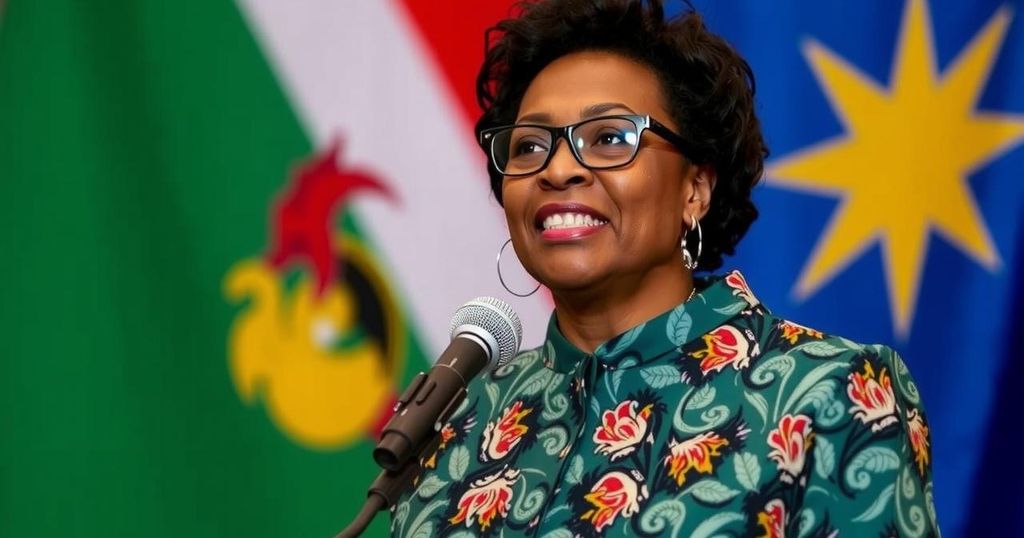World news
2024 ELECTIONS, AFRICA, AFRICAN NATIONAL CONGRESS, BRITAIN, DEMOCRACY, ELECTIONS, ELECTORAL PROCESS, GOVERNANCE, GOVERNMENT, INDEPENDENT PATRIOTS FOR CHANGE, IPC, ITULA, NANDI - NDAITWAH, NET, NEW INDEPENDENT PATRIOTS FOR CHANGE, NEWCASTLE, SOUTH AFRICA, SOUTHERN AFRICA, SWAPO
Aisha Khan
0 Comments
Namibia Elects Its First Female President Amidst Controversy
Namibia elected its first female president, Netumbo Nandi-Ndaitwah, who secured 57% of the votes in a disputed election. The ruling Swapo party has retained its 34-year hold on power. Despite technical issues during voting and opposition claims of illegality, Nandi-Ndaitwah’s victory signifies a resilient political landscape in contrast to neighboring countries experiencing significant shifts in governance.
Namibia has marked a historic milestone by electing its first female president, Netumbo Nandi-Ndaitwah, who was declared the winner of last week’s presidential elections, thereby continuing the ruling Swapo party’s dominance over the nation for 34 years. Despite forecasts suggesting a potential runoff, Nandi-Ndaitwah won decisively with 57% of the votes, solidifying Swapo’s grip on the country since its independence from apartheid South Africa in 1990. Following the announcement of the results, the 72-year-old leader proclaimed, “The Namibian nation has voted for peace and stability.”
Nandi-Ndaitwah’s political career is rooted in the struggle for independence; she was part of the underground movement in the 1970s and was promoted to vice-president in February after the passing of former President Hage Geingob. However, the elections were marred by technical issues, including a shortage of ballot papers, prompting the opposition to challenge the results in court, claiming the extended voting period was unlawful.
The main opposition leader, Panduleni Itula, received 25.5% of the vote, which is a reduction from his 29% share in the previous election. His party, the Independent Patriots for Change (IPC), managed to acquire 20% of the parliamentary vote, contrasting with Swapo’s reduced parliamentary support of 53% compared to 65% in the last election. Nandi-Ndaitwah’s success is particularly notable as it indicates a shift in voters’ sentiments toward an incumbent liberation movement, a situation that has seen different results in Southern African countries recently due to rising discontent among younger voters.
The recent presidential elections in Namibia are significant not only due to the victory of Netumbo Nandi-Ndaitwah, the first female president, but also for the broader implications concerning the Swapo party’s unyielding control over the nation since liberation from South African rule in 1990. The context includes emerging challenges from opposition parties, technical issues during the voting process, and shifting public sentiment reflecting the electorate’s increasing awareness and readiness to question longstanding governance practices. The elections drew comparison with recent political shifts in neighboring Southern African countries, marking a potential turning point for regional politics and governance.
In conclusion, Netumbo Nandi-Ndaitwah’s election as Namibia’s first female president is a historical achievement that underscores the continuity of the ruling Swapo party’s power, even amid emerging challenges from opposition parties and public dissent. The administration’s stability contrasts with regional trends of liberation movements facing increasing scrutiny, pointing to a potentially transformative period in Namibian politics. Despite the disputed results, Nandi-Ndaitwah’s leadership is poised to navigate the country toward a future reflecting both peace and stability, as noted in her acceptance statement.
Original Source: www.theguardian.com




Post Comment